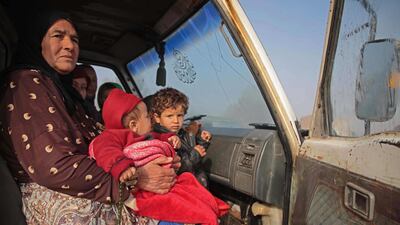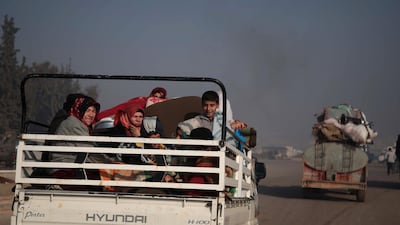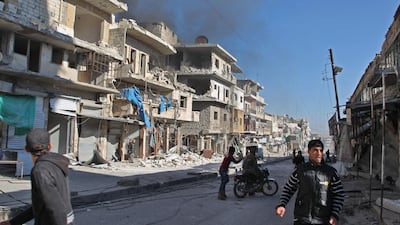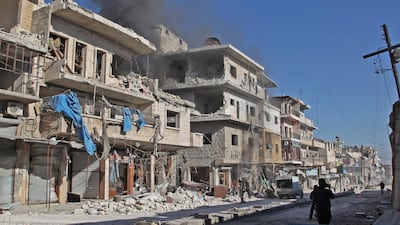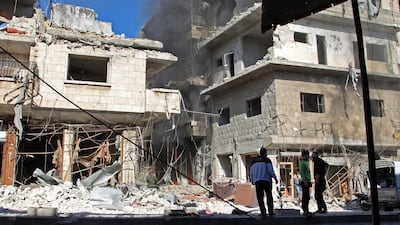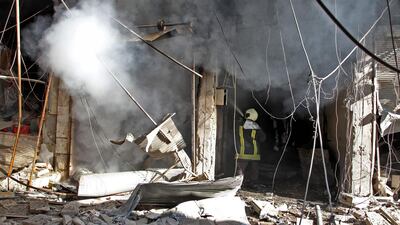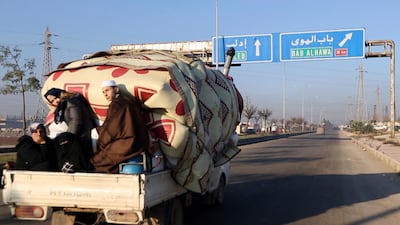Russia and China on Friday blocked a United Nations Security Council resolution that would have extended cross-border aid from Turkey and Iraq to millions of Syrian civilians for the next 12 months.
By using their veto power the two countries rejected plans drawn up by Kuwait, Germany and Belgium, prompting angry exchanges in the council chamber. With less than three weeks left to salvage a solution, Britain's top diplomat to the UN warned Russia “not to play dice with people's lives”.
Kelly Craft, US Ambassador to the UN, said she was in shock at the dire humanitarian situation that could develop after January 10, when the current UN aid mission to the conflict-hit north-western and north-eastern parts of Syria expires.
Humanitarian aid currently enters through four UN-designated checkpoints without the formal permission of President Bashar Al Assad's regime in Damascus. The aid mission, until now annually renewed, has been in operation since 2014.
The resolution drawn up by Kuwait, Germany and Belgium appeared an effort to find a compromise, as it would have reduced the number of checkpoints to three, dropping an entry point in Jordan barely used since 2018. The plan came after two weeks of efforts to find a breakthrough and it had the support of all council members, other than Russia and China.
A competing Russian resolution would have granted only a six-month extension while cutting the number of UN crossing points to two. It failed to get the minimum nine votes.
Friday's scenes represented one of the worst diplomatic failures over the deadlocked civil war in Syria. It was the 14th time that Russia, Mr Al Assad's closest ally, has used its veto since the start of hostilities in 2011.
Vassily Nebenzia, Russia's ambassador to the United Nations, defended the decision, saying the proposed resolution was obsolete because the regime in Damascus had “retaken control of most” of Syria, and that change had to be recognised.
However his comments came a day after UN officials briefed the council that the humanitarian situation was worse than a year ago.
“Syrian government forces and their allies continue to shell and conduct air strikes on areas under the control of non-state armed groups, including listed terrorist entities, in Idlib and Aleppo,” Assistant UN Secretary General Ursula Mueller said.
“Without the cross-border operation, we would see an immediate end of aid supporting millions of civilians. That would cause a rapid increase in hunger and disease, resulting in death, suffering and further displacement, including across borders.”
Four million Syrians benefit from the cross-border aid shipments while 11 million receive help from international humanitarian groups.
“Today we took a huge step backwards in credibility where it really matters,” said Ms Craft, the US ambassador and current president of the council. “I am deeply and profoundly disappointed.”
Britain's Ambassador to the UN, Karen Pierce, accused Russia and China of shedding “crocodile tears” while conducting a “cynical attempt to score political points” on what was “a sad and sorry day” that would damage Syrians most.
“The Russian Federation and China gave no credible explanation for their veto... there is no justification for this,” Ms Pierce said.
“No one could pretend, Madam President, that things were improving on the ground. I listened very carefully to what the Russian representative said, and I heard him say that they were motivated 'purely by the humanitarian aspect'. Even by known standards, this is breathtaking in its hypocrisy.”
Anne Gueguen, France's deputy permanent representative to the UN, called the Russian veto irresponsible.
It was the second time in four months that Russia has vetoed a resolution dealing with the humanitarian situation in Syria. In September, Moscow used blocked a resolution, also sponsored by Kuwait, Germany and Belgium, calling for a ceasefire in Idlib.
Richard Gowan, UN director at the International Crisis Group, said Friday's failed votes were the latest episodes in “a disgrace for the Security Council, which was likely to stay that way”.
"The best scenario now is that everyone takes a deep breath, realises that this is a pointless mess and negotiates a compromise for early 2020," Mr Gowan told The National.
“The fact that Germany, Kuwait and Belgium abstained on the Russian resolution is a sign that more bargaining is possible. Still, we have to accept that the council is in a sad endgame over Syria and that disputes like this will only recur.
“Everyone is just exhausted by this war, and diplomats see marginally greater chances of success in talking about Yemen and perhaps even Ukraine.”
Earlier on Friday, the UN special envoy on Syria, Geir Pedersen, outlined a deteriorating picture of efforts to find a political solution in Syria.
A long-awaited committee to form a new constitution for the country met in October in Geneva, but after the latest round of talks broke down Mr Pedersen acknowledged there had been little progress.

